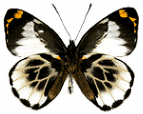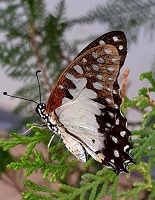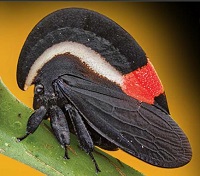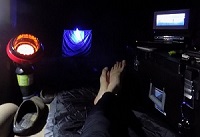
-
nomad

- Premium Member - 2025

- Posts: 24
- Joined: Sat Dec 03, 2022 10:22 pm
Re: Rare Delias butterflies
by nomad » Tue Feb 25, 2025 7:08 pm

-
Chuck

- Posts: 1441
- Joined: Mon May 23, 2022 2:30 pm
Re: Rare Delias butterflies
by Chuck » Tue Feb 25, 2025 6:10 pm
Just an idea to maybe pass on?wollastoni wrote: Tue Feb 25, 2025 1:56 pm Depends.
Delias hallstromi is not rare on Mount Hagen. Females though are hard to find as they stay in the canopy (a friend of mine has been lucky and caught several of them including the one shown by Peter).
In Solomons I saw constantly some canopy dwelling Lycaenids that NEVER came down. I watched them for years, around a big Mango tree at the hotel.
One afternoon a thunderstorm came in and it got very dark very quickly. I had the sliding door from the room to the patio open, and they flew right in, headed for the lights.
Maybe a MV at dusk or before a thunderstorm?
-
58chevy

- Posts: 498
- Joined: Mon May 23, 2022 5:58 pm
Orangetips
by 58chevy » Tue Feb 25, 2025 5:11 pm
-
nomad

- Premium Member - 2025

- Posts: 24
- Joined: Sat Dec 03, 2022 10:22 pm
Re: Rare Delias butterflies
by nomad » Tue Feb 25, 2025 2:03 pm

-
wollastoni

- Site Admin

- Posts: 693
- Joined: Fri Mar 18, 2022 9:51 am
Re: Rare Delias butterflies
by wollastoni » Tue Feb 25, 2025 1:56 pm
Delias hallstromi is not rare on Mount Hagen. Females though are hard to find as they stay in the canopy (a friend of mine has been lucky and caught several of them including the one shown by Peter).
Delias flavissima is not rare in Gumine. The female is still undescribed (even if it is work in progress)
Some other species are extremely rare on the field. For example, the Pass Valley is a popular collecting spot... and Delias fioretti who lives there is known by less than 5 specimens.
As always, "rare" means "rare in collection".
Several species have still undescribed female, unknown locality (where does Delias nigropunctata really lives ???), some have been found only once because nobody can go in some Papuan area (Foja Mounts Delias), some are known from less than 10 specimens (Delias elusiva, ...), some have a large distribution area but are really hard to find (Delias agoranis) and so on.
-
Chuck

- Posts: 1441
- Joined: Mon May 23, 2022 2:30 pm
Re: New Papilio described today
by Chuck » Tue Feb 25, 2025 1:42 pm
I have to say, I started with a "keep it simple" Jshuey-style paper. That turned out to be a dozen pages. Aside from my observations, a lot of it was reiterating, in one place, past work; researchers such as Wang, Schmidt, and Scriber had made it abundantly clear that MST was a unique taxon, without formally naming it.
Once my draft was "perfect" I sent it to member Eurytides to add his data gleaned from raising larvae. And, he reviewed it- and slaughtered my work- six times. It was at times defeating. That all took a good six months.
At that point, we realized that Chris Schmidt, who had published on MST, had a ton of data. And, being a professional, he could edit the paper to be acceptable. So we brought him on, which turned out to be a great decision because what he brought- in content and in style- resulted in a far better, and far more comprehensive, publication.
As we three then looked at what we had, what was missing was updated genetic analysis. So Julian Dupuis joined us, and provided great insights (some of which I am still yet to understand) that addressed the taxonomic status with "new technology." Even then, his hands were tied because there actually are very few barcode records of MST, and worse some are COI 3' and some are COI 5' which don't map to each other. It's like describing a person by having a view of their left side, and the back of their head.
From the date we invited Chris to submission to ZooKeys for publication was almost another year. Ouch. So elapsed time then was some 16 months.
At "the last minute" ZooKeys reviewer Dr. Felix Sperling requested two significant changes/ flagged issues:
1. The proposed name- Papilio haudenosaunee (Haudenosaunee is what most know better as the Iroquois) was possibly considered taking of indigenous naming / property. Though the name had been suggested by a local American native, when asked if the Haudenosaunee would bless the name, the response was that it was impossible, there were too many factions to agree. So the name was changed to solstitius.
2. That we address the recently introduced Papilio bjorkae (Pavulaan, 2024). Chris drafted an analysis, which took more time.
I also should note that many of my charts- such as quantity observed over time- were eliminated because they were representative of the Finger Lakes region, not the entire range. This all impressed on me that there's a lot of data that gets stripped out of publications. My data and charts and such though do appear in the annual reports submitted to NYS, and will be in my full notes once compiled.
In working with a team, inevitably there are differences of opinion and approach. And, sometimes we have to pick our battles. Case in point, in the paper we do treat Spring Form in NY as the spring form of glaucus; it has been convention for a century so we stuck with it. That said, I believe that the regional Spring Form is in fact not glaucus. Further, our paper states that glaucus does not occur in Finger Lakes, so the astute reader will realize we are inconsistent. But if we had even hinted that Spring Form may not be glaucus it would open the door for one of the VIP reviewers to insist we address that, which would be another five years- so I particularly was dead set against addressing Spring Form and didn't question how it was addressed.
I am humbled by the results of the paper. I thought I did a damned great job in my draft. The end result, much of it written and edited by Chris Schmidt, is a magnitude better.
There's still much to do; we still don't know the full range of MST, or canadensis, or glaucus, or Appy. We have so few specimens in the genetic databases, and little understanding of hybridization. Then we have Pavulaan's bjorkae paper that presents possible new taxa (which conveniently maps to my observations) all of which needs to be explored, analyzed, and published. Some thing there's nothing left to discover; I'd argue that there's plenty to discover, right in our back yard, concerning common and showy butterflies.
-
Chuck

- Posts: 1441
- Joined: Mon May 23, 2022 2:30 pm
Re: Packing for a trip
by Chuck » Tue Feb 25, 2025 12:54 pm
On packing- since the missus bought stuff in FL, and I STILL had room in my carry-on, I got to fit her hairdryer and brush into my little luggage too. I should add, I didn't even wear all the clothes I did bring (which wasn't a lot.)
Priorities in packing.
-
Chuck

- Posts: 1441
- Joined: Mon May 23, 2022 2:30 pm
Re: Tiger Swallowtails of NY: Finger Lakes, Part II
by Chuck » Tue Feb 25, 2025 12:52 pm
-
Chuck

- Posts: 1441
- Joined: Mon May 23, 2022 2:30 pm
Re: Rare Delias butterflies
by Chuck » Tue Feb 25, 2025 12:30 pm
How many of these Delias are rare in the wild? Mount Hagen isn't exactly remote from civilization, there's a daily flight.nomad wrote: Mon Feb 24, 2025 12:18 pm Delias hallstromi from Kerowagi District (top) and Mount Hagen New Guinea with the rare female 'middle specimen' collected by a friend.
-
nomad

- Premium Member - 2025

- Posts: 24
- Joined: Sat Dec 03, 2022 10:22 pm
Re: Rare Delias butterflies
by nomad » Mon Feb 24, 2025 9:30 pm

-
nomad

- Premium Member - 2025

- Posts: 24
- Joined: Sat Dec 03, 2022 10:22 pm
Re: Rare Delias butterflies
by nomad » Mon Feb 24, 2025 12:18 pm

-
Borearctia

- Posts: 20
- Joined: Tue May 31, 2022 8:02 pm
Re: bacon beetles
by Borearctia » Mon Feb 24, 2025 6:18 am
I have kept a small collection of Zygaenidae in a poorly closing cardboard box for over 15 years.
No pesticides have been used.
There is not the slightest sign of damage.
Andreas
-
wollastoni

- Site Admin

- Posts: 693
- Joined: Fri Mar 18, 2022 9:51 am
Re: Rare Delias butterflies
by wollastoni » Sun Feb 23, 2025 5:47 pm
Females are very rare in collection.
-
Trehopr1

- Global Moderators

- Posts: 1135
- Joined: Thu Mar 31, 2022 1:48 am
Re: Rare Delias butterflies
by Trehopr1 » Sun Feb 23, 2025 5:42 pm
Those two lovely black species you just posted are exceptional. I think these black species are especially cool along with D. mayerhoferi (?) which is tops in its black and red garb.
On general appearance I have to say that D. gilliardi just doesn't have the general appearance of a delias at all. The shape of its forewings forms more of a pointed apex rather than the typical rounded tip that Delias have. However, it still remains a very beautiful little species and your specimens are certainly "spot on" superb !
-
nomad

- Premium Member - 2025

- Posts: 24
- Joined: Sat Dec 03, 2022 10:22 pm
Re: Rare Delias butterflies
by nomad » Sun Feb 23, 2025 3:01 pm
-
nomad

- Premium Member - 2025

- Posts: 24
- Joined: Sat Dec 03, 2022 10:22 pm
Re: Rare Delias butterflies
by nomad » Sun Feb 23, 2025 2:11 pm

-
wollastoni

- Site Admin

- Posts: 693
- Joined: Fri Mar 18, 2022 9:51 am
Re: Rare Delias butterflies
by wollastoni » Sun Feb 23, 2025 10:02 am
The white margin on HW varies a lot as I have one specimen with nearly no white at all.
BTW I would agree with Tuzon that ssp. eefi from Tembagapura is a true species. Very different from nominate.
-
Chuck

- Posts: 1441
- Joined: Mon May 23, 2022 2:30 pm
Re: Asia's Illicit Butterfly Trade
by Chuck » Sat Feb 22, 2025 8:06 pm
You make the box(s) you want them shipped in, provide the set pins, and I’ll cut you a deal
-
nomad

- Premium Member - 2025

- Posts: 24
- Joined: Sat Dec 03, 2022 10:22 pm
Re: Rare Delias butterflies
by nomad » Sat Feb 22, 2025 6:59 pm
-
kevinkk

- Premium Member - 2025

- Posts: 536
- Joined: Mon May 23, 2022 5:06 pm
Re: Asia's Illicit Butterfly Trade
by kevinkk » Sat Feb 22, 2025 5:36 pm
Exactly, all you need to do is look at Ebay and search for example Ornithoptera, but only from USA sellers, you'll find a very limited choice.Papilio_indra wrote: Fri Feb 21, 2025 10:46 pm I see a parallel here with discussions on other threads in this forum regarding how difficult it is to commercially import butterflies into the United States. The fact that it can be difficult to work with U.S. Fish & Wildlife Service and their permit system may actually be a good thing for the importers who go to the trouble of meeting all of the requirements as the bureaucracy helps to keep the foreign butterfly market in America from being flooded with specimens.
Everything is already spread and in Riker mounts. I can fully see why things are expensive, I'd like some Pasalidognathus, but I'd slowly go broke.
When I tried my website back in the mid 90's I simply bought from Bioquip, never was a money maker.


